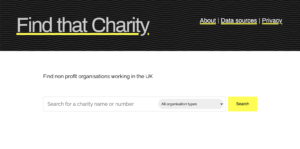Find that Charity: the place to go for data on 660,000 non-profit organisations
Find that Charity, a tool created by our team member David Kane to help look up non-profit organisations, has been updated and refreshed. It now brings together data from 16 different sources and is the most comprehensive database of non-profit organisations in the UK. The updated site, https://findthatcharity.uk, draws on open data published by official regulators, expanding coverage to 660,000 organisations across the non-profit sector and government. In this post, David explains the updates.
Find that Charity is a tool for finding non-profit organisations by name. It brings together data from a number of sources to include a record for a large number of non-profit organisations in the UK, including every registered charity.
When I created it in 2017, I was frustrated that the three UK charity regulators all published data in different formats, with no way of linking between them. So Find that Charity standardises those records and makes it easy to enhance other charity data. It is hosted by 360Giving and the code that powers the site is available on Github.
When it was first launched the site focused on registered charities, using data from the three UK charity regulators. The latest version includes open data on other non-profit organisations, such as universities, sports clubs, Community Interest Companies and other non-profit companies. It also includes a number of bodies that are part of government, such as local councils, schools and NHS bodies. The range of data aims to cover as much as possible of the organisations included in the org-id list of organisation identifiers.
Along with the updated data, I’ve refreshed the look and feel of the site, making it easier to use and navigate.
What can you find out?
Each organisation listed on Find that Charity has its own ‘organisation record’. This is a page which shows information about that organisation. The amount of information varies depending on what has been published by the regulator. For some organisations, all we know is their legal form and a name. Others have included more detailed data.
A typical organisation record will give additional information. This can include:
- Whether the organisation is currently active
- The date the organisation was registered (and when it was removed, if necessary)
- The organisation’s registered postcode
- It’s latest annual income
- A description of the organisation
A key part of the update is the introduction of “linked records”. This is where we know that the same organisation appears in different places across multiple organisation registers. For example, many registered charities are also registered companies. We don’t know about all of these linked records as not all regulators publish them, and some have to be manually collected.
In the new version, the data is most comprehensive for charities where the regulators publish more information. For example, for registered charities in England and Wales, Find that Charity records information about where these charities actually work, rather than just their registered office location.
Each organisation record also contains important metadata, including the source of the record, plus the last time it was updated. This enhances the quality of the data and helps give people more confidence to use it.
What can you do with Find that Charity?
If you’re using or analysing data about charities and non-profit organisations, you can use Find that Charity and its database to enhance your data and improve its quality.
As the name suggests, one of Find that Charity’s main features is searching for organisations. By finding out where a particular organisation appears in the regulator’s records, you can match the organisation using an organisation identifier rather than just its name. This means you can show that even if someone writes “The Dogs Trust” rather than “Dogs Trust”, they are both referring to the same organisation.
Find that Charity has tools to make this process of matching as easy as possible. If you’ve got a long list of charities which you need to find identifiers for, the Reconciliation API makes this easy, in conjunction with OpenRefine. I’ve previously written a guide to using OpenRefine for reconciliation like this (part one and part two).
There’s also a tool for adding data to a CSV file. If you have a file containing organisation identifiers, like charity numbers, this tool makes it easy to add more data about them. For example, you can add their postcode, or their latest annual income.
Finally, you can now download lists of organisations in a consistent format. The “Download as CSV” option appears whenever you look at a list of organisations – for example Community Amateur Sports Clubs.
What’s next?
I’d love to hear your feedback on the update, and whether it works for you. The update means that there’s a lot of data behind the scenes, and I’m still looking for ways to showcase and share that data.
Find that Charity is developed by David Kane, and hosted by 360Giving.

